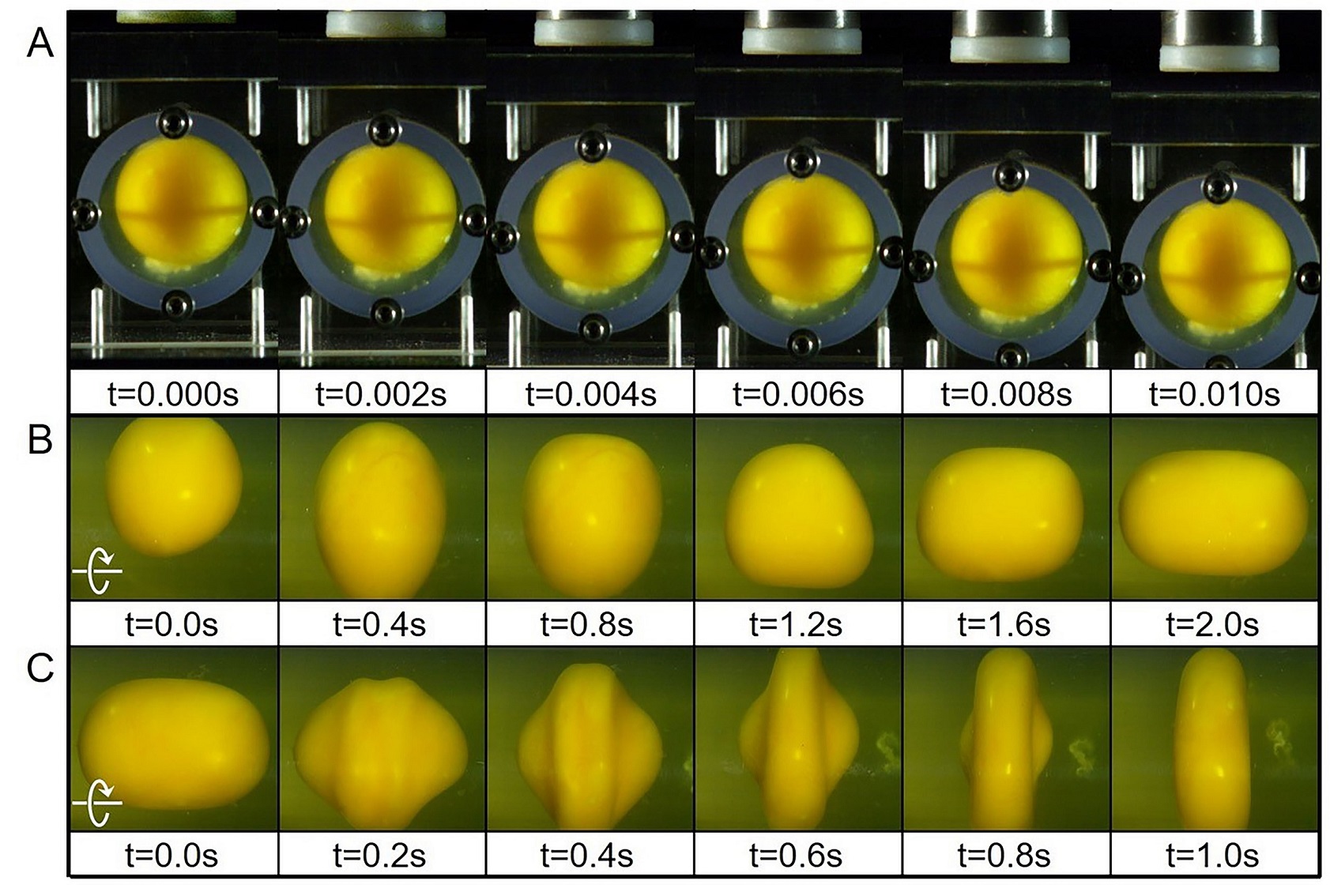A Team of Mechanical Engineers From Villanova University and Pennsylvania State University Turns To Eggs To Model Concussion and to Better Understand Sudden Impact Brain Injuries
First-of-its-kind findings uncover the critical role of the brain’s cerebrospinal fluid during impact, and show promise for advances in brain biomechanics

(a) Reactions of the egg yolk under the translational impact. The shell was impacted by a hammer to achieve the translational acceleration up to 600g, g = 9.8 m/s2. (b) Reactions of the egg yolk under the rotational acceleration impact. The container was set to rotate instantaneously from 0 rad/s to 400 rad/s within 1 s, after which it was maintained at the constant angular velocity of 400 rad/s. (c) Reactions of the egg yolk under the rotational deceleration impact. The rotation speed of the container was reduced sharply from 400 rad/s to 0 rad/s within 1 s to create a deceleration impact on the egg yolk.
VILLANOVA, Pa. – A team of mechanical engineering researchers from Villanova University College of Engineering and Pennsylvania State University have published new research findings that shed light on what specifically happens to the brain of a patient who experiences traumatic brain injury, and provides a new perspective on the response of a membrane-bound soft object to sudden external impacts, helping to better understand flow physics of head injury.
“Our findings uncover an intriguing mystery of concussive brain injury: That direct translational impact does not cause egg deformation. It is actually the rotational acceleration or deceleration that causes tremendous egg yolk deformation,” says Qianhong Wu, PhD, Associate Professor of Mechanical Engineering at Villanova College of Engineering, and lead author of the journal article “How to Deform an Egg Yolk? On the Study of Soft Matter Deformation in a Liquid Environment,” published in the January 19 issue of the scientific journal Physics of Fluids.
Coauthors are Ji Lang, a doctoral student at Villanova College of Engineering, and Rungun Nathan, PhD, Associate Professor of Engineering at Pennsylvania State University.
“In any impact, there are both translational and rotational impacts,” says Dr. Wu. “Our findings suggest that soft matter, such as the brain, is very sensitive to rotational deceleration. Knowing this will now help in the development of better helmets, other protection gear, and better airbag designs for automobiles.”
Working on the brain of a mouse, Dr. Wu and his team use a unique approach to examine the response of real brain matter to the same impacts. He has medical collaborators correlate the findings to human data.
The team’s findings will help medical doctors understand the severity of a case based on how the patient was injured in the first place, and will help to locate the specific part of the brain that is injured. For patients of brain injury, these findings can guide patients in how to avoid injury, and if there is an impact, can help the patient understand the severity of the injury based on how the incident happened.
“This is completely new, no one has ever come up with this research idea,” says Dr. Wu, who is also director and founder of the College of Engineering’s Cellular Biomechanics and Sport Science Laboratory. "This finding uncovers an intriguing mystery about the reason for concussive brain injury, and highlights the critical role of the cerebrospinal fluids in the impact transmission and injury mitigation, which is especially useful for scientists in the field of brain biomechanics."
To read the Physics of Fluids journal article, click here.
About Villanova University: Since 1842, Villanova University’s Augustinian Catholic intellectual tradition has been the cornerstone of an academic community in which students learn to think critically, act compassionately and succeed while serving others. There are more than 10,000 undergraduate, graduate and law students in the University's six colleges—the College of Liberal Arts and Sciences, the Villanova School of Business, the College of Engineering, the M. Louise Fitzpatrick College of Nursing, the College of Professional Studies and the Villanova University Charles Widger School of Law. Ranked among the nation’s top universities, Villanova supports its students’ intellectual growth and prepares them to become ethical leaders who create positive change everywhere life takes them. For more, visit www.villanova.edu.
